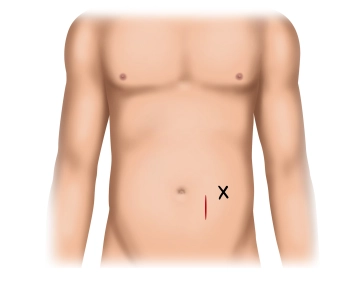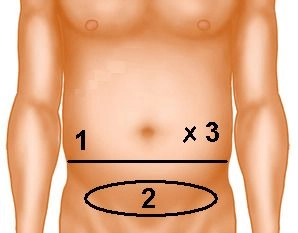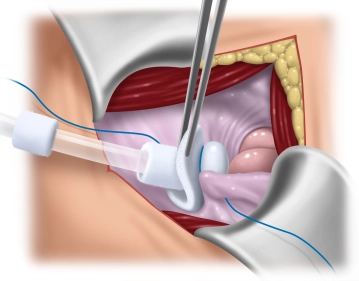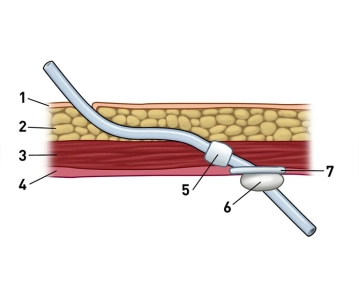Pararectal skin incision of about 6 cm inferior to the line connecting the umbilicus with the marked catheter exit. Divide the subcutaneous tissue by electrosurgery and expose the anterior lamina of the rectus sheath.
-
Incising the pararectal skin and exposing the anterior rectus sheath lamina
-
Exposing the posterior rectus sheath lamina and dividing the peritoneum
Incise the anterior lamina of the rectus sheath in a sagittal direction and dissect the rectus muscle in blunt fashion. Open the peritoneum superior to the arcuate line and preplace a peritoneal suture (PDS 3/0) at the inferior pole of the incision.
Tip:
- For better stability, the catheter should be inserted superior to the arcuate line.
- Use a monofilament suture when closing the peritoneum and anchoring the catheter because this helps avoid suture hole laceration.
-
Placing the dialysis catheter and closing the peritoneum
Insert the CAPD catheter into the Douglas pouch with dressing forceps. When closing the peritoneum subsequently with a running suture (PDS 3-0), the latter incorporates the catheter such that the intra-abdominal silicone bead of the catheter adheres to the peritoneum, while the extraperitoneal felt plate rests anterior to the posterior lamina of the rectus sheath. This ensures secure catheter fixation and “watertight” closure of the peritoneum.
-
Exiting the dialysis catheter
Figure on right: (1) Skin, (2) subcutaneous tissue, (3) rectus muscle, (4) peritoneum/fascia, (5) felt cuff, (6) silicone bead, (7) felt plate
Mount the free end of the catheter on the tunneling stylet, pull the catheter through the rectus muscle in staggered fashion and let it exit through the skin at the previously marked location. With this maneuver the second felt cuff will rest within the rectus muscle. Mount the titanium adapter.
Tip:
- The submuscular course of the catheter should be smooth avoiding any kinking.
Check the position of the catheter in the pouch of Douglas by injecting contrast agent under brief
Activate now and continue learning straight away.
Single Access
Activation of this course for 3 days.
Most popular offer
webop - Savings Flex
Combine our learning modules flexibly and save up to 50%.
€44.50 / yearly payment
general and visceral surgery
Unlock all courses in this module.
€149.00 / yearly payment




